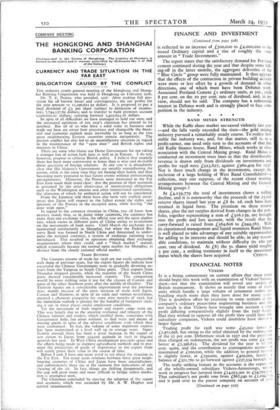COMPANY MEETING
THE HONGKONG AND SHANGHAI BANKING CORPORATION
(Incorporated in the Colony of Hongkong. The Liability of Members is limited to the extent and in manner prescribed by Ordinance No. 6 of In, of the Colony.)
CURRENCY AND TRADE SITUATION IN THE FAR EAST DISLOCATION CAUSED BY THE CONFLICT
THE ordinary yearly general meeting of the Hongkong and Shang- hai Banking Corporation was held in Hongkong on Felnuary 25th.
Mr. T. E. Pearce, who presided, said: After making full pro- vision for all known losses and contingencies, the net profits for the year amount to 15,296,621.32 dollars. It is proposed to pay a final dividend of £3 per share (subject to deduction of income- tax), 7,744,537.82 dollars; and to transfer to bank premises account t,000,000.00 dollars; carrying forward 3,400,634.26 dollars.
In spite of all difficulties we have managed to hold our own, and the measured optimism of last year's chairman has proved to be justified. But all of us who have a solid stake in business and trade out here are aware how precarious and changeable the finan- cial and economic outlook must inevitably be so long as the two great neighbouring Eastern countries remain antagonistic. The present conflict has also led to an unsatisfactory situation in regard to the maintenance of the "open door" and British rights and interests in China.
There are some who blame our Home Government for not taking a stronger line of action both here as well as in Europe. I do not, however, propose to criticise British policy. I believe that recently there has been more controversy at home than is wise and desirable about questions of foreign relations. At any late it is abundantly clear that His Majesty's Government are steadily strengthening the nation, while at the same time they are freeing their hands and thus becoming more prepared to face future events without embarrassing entanglements. Moreover, the Powers most interested in the Far East have made their stand clear: that the position of their nationals is governed by the strict observance of international obligations such as the Washington treaties and other international agreements, the alteration of which by unilateral action will not be considered.
From the Japanese side there have also been very explicit assur- ances that Japan will respect to the fullest extent the rights and interests of the Powers in the occupied areas, while leaving "the door wide open."
In regard to the currency situation in China, you all know how matters stand; that, as in_paany other countries, the currency has more than one exchange value, the official rate and the open market rate, which varies in different parts of China owing to restrictions on the movements of bank notes. Until March the exchange was maintained satisfactorily in Shanghai, but when the Federal Re- serve Bank was formed in North China and threatened to under- mine the national currency, a system of exchange rationing was introduced. This resulted in operators obtaining their exchange requirements where they could, and a "black market" started, which eventually became the normal open market for Shanghai, as distinct from the closely rationed official market.
TRADE RE-rums
The Customs returns of trade for 1938 are not easily comparable with those of previous years, but the export figures do indicate how successful the Chinese Government were in gradually diverting ex- ports from the Yangtsze to South China ports. Thus exports from Shanghai dropped greatly, while the majority of the South China ports showed considerably increased exports. The comparison would be more striking were it not for the closure of Canton and some of the other Southern ports after the middle of October. The Tientsin figures are a considerable improvement over the previous year, mainly because of the great increase of trade with Japan. Canton and Hankow, in spite of air raids and various restrictions, enjoyed a phantom prosperity for some nine months of 1938, but the immediate outlook is gloomy for the handful of foreigners stick- ing it out in those places under unpleasant conditions.
Yet the movement of both import and export cargo went on. This was largely due to the amazing resilience and tenacity of the Chinese farmers and traders, which enabled them, sometimes with Government help, but often without, to find ways and means of moving goods in spite of the adverse conditions with which they were confronted. In fact, the volume of some important exports has been maintained at a level well up to average years. Signi- ficantly enough there has been a great increase in the export of raw cotton to Japan, from 234p00 quintals in 1937 to 964,000 quintals last year. In West China development proceeds apace and the efforts being made to improve agricultural methods and to pro- mote the production of goods of importance to the export trade will surely prove their value in the course of time.
Before I end, I have one more word to say about the situation in the Far East. For many years relations between these great neigh- bouring countries of China and Japan have been unsatisfactory, and unfortunately there are at the moment few indications of any clearing of the air. In fact, things are drifting dangerously, and the gap will grow more and more difficult to bridge unless media- tion is attempted soon.
The Chairman concluded by moving the adoption of the report and accounts, which was seconded by Mr. A. W. Hughes and carried unanimously.














































 Previous page
Previous page